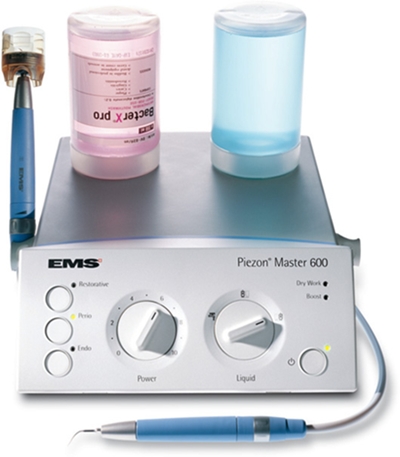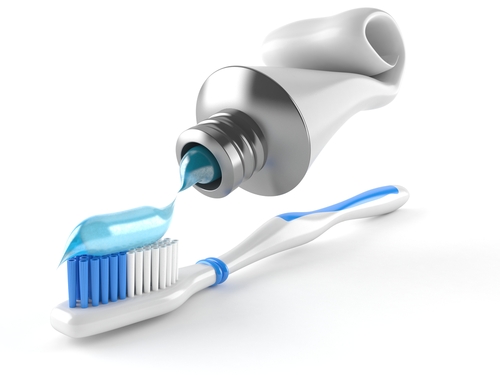Scaling is a procedure that involves the removal of hard dental plaque (calculus) that accumulates on the surface of the teeth, by using an ultrasonic scaler.
How is dental plaque formed? Is its formation related to the hardness of water?
Immediately after the last teeth cleaning, an acquired pellicle composed of glycoproteins contained in saliva begins to form on the surface of teeth. Then, bacteria present in the oral cavity starts to accumulate on this pellicle. From this moment, this deposit is called plaque, which in addition to glycoproteins and bacteria also contains polysaccharides, desquamated epithelial cells, leukocytes, calcium and phosphorus. In the first stage of plaque maturation, it is usually colonized by non-cariogenic bacterial strains, and in the further stages also those that cause caries. Therefore, the presence of plaque on the teeth is a threat to enamel. Plaque cannot be removed by rinsing the mouth. Instead, a toothbrush and floss must be used. The plaque often assumes a color from light yellow to dark brown, due to the deposition of various dyes, metals and chemical compounds from food contained in the diet or other factors such as: smoking, drinking strong coffee and tea, red wine, medications, and herbs containing dyes.
Dental plaque is formed from the bacterial pellicle within 24 hours of performing oral hygiene procedures due to the deposition of mineral salts naturally present in the saliva in the plaque. The presence of plaque does not result from drinking hard water, but because, it is not removed quickly enough, which allows for it to transforms from a pellicle to plaque.
Keeping the tooth surfaces free of the bacterial plaque is extremely important.
Therefore, it is necessary to clean and polish teeth. Thanks to these treatments, the surface of the teeth is smoothened, which significantly hinders the colonization of bacteria, and thus, the growth of the bacterial plaque.
And it provides the patient with a pleasant feeling of tooth smoothness.
At the Dorotowska Dental Clinic, we use the EMS -Piezon Master scalers.
These ultrasonic scalers operate by generating vibrations at a high frequency of several dozen thousand times per second. These vibrations are transmitted to a special scaler working tip, which the hygienist operates in the patient's mouth. The tip applied to the tooth transfers vibrations to its surface, which makes the plaque break very easily and fall off the tooth surface.
What is scaling?
It is a procedure that involves the removal of the supra- and sub-gingival plaque using an ultrasonic scaler. This device, which is operated by a dental hygienist, vibrates at a frequency of tens of thousands of times per second. The tip applied to the tooth surface vibrates on the plaque and makes it fall off. The treatment takes place under cooling with a spray of water.
Zdjecie
Is scaling painful?
Plaque removal is not a pleasant treatment, but most often it is not painful. It depends on the individual’s sensitivity and perception of pain. The procedure can be performed under local anesthesia.
How often should you have dental plaque removed?
Professional plaque removal according to the WHO should take place once every 6 months. Such a treatment should be combined with a check-up visit with a dentist at the Dorotowska Dental Clinic in order to enjoy healthy teeth for longer.
Can the formation of plaque be prevented?
The most important hygiene procedure to prevent plaque formation is tooth brushing, which should be done at least twice a day. To prevent dental plaque in each quarter of the mouth, it is necessary to brush one’s teeth for about 5 minutes.
In addition to brushing the teeth, it is necessary to use dental floss, as well as fluoride mouth rinses.

What complications are associated with long-term plaque deposition?
Plaque maintains the inflammatory state of the gums and irritates them mechanically. The lack of scaling procedures in the long-term can result in the accumulation of subsequent layers of bacterial plaque that causes inflammation of the periodontal tissues. In the advanced stages of periodontitis, the teeth become loose and, consequently, they may even be lost.
Dental plaque can also contribute to bad breath from the mouth.
Not removing the dental plaque in a timely manner can also lead to the demineralization of enamel and the development of dental caries.
Offer
Warszawa Ochota
Adres:
ul. Dorotowska 9
02-347 Warszawa
Telefon: +48 501 328 772
E-mail: recepcja@ddclinic.pl
Godziny otwarcia:
Poniedziałek - Piątek: 9:00 - 20:00
Sobota: nieczynne
Warszawa Ursynów
Adres:
ul. Migdałowa 10 lok.5
02-796 Warszawa
Telefon: +48 502 070 050
E-mail: recepcjaursynow@ddclinic.pl
Godziny otwarcia:
Poniedziałek - Piątek: 12:00 - 20:00
Sobota: nieczynne
